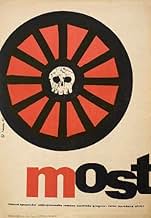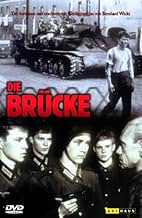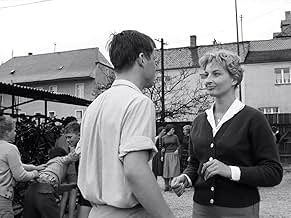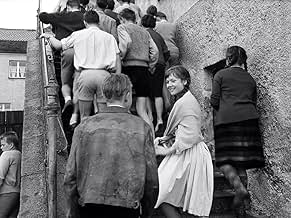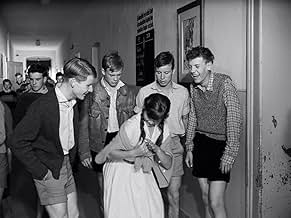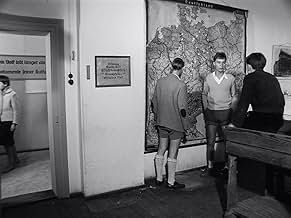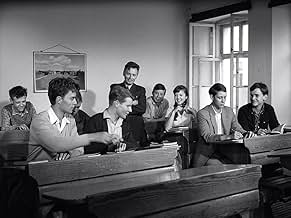PUNTUACIÓN EN IMDb
7,9/10
9,1 mil
TU PUNTUACIÓN
En 1945, Alemania está siendo invadida y nadie queda para luchar excepto los adolescentes.En 1945, Alemania está siendo invadida y nadie queda para luchar excepto los adolescentes.En 1945, Alemania está siendo invadida y nadie queda para luchar excepto los adolescentes.
- Dirección
- Guión
- Reparto principal
- Nominado para 1 premio Óscar
- 16 premios y 1 nominación en total
Volker Bohnet
- Hans Scholten
- (as Folker Bohnet)
Günter Hoffmann
- Sigi Bernhard
- (as Günther Hoffmann)
Reseñas destacadas
A couple of days before the end of World War II, seven sixteen year-old German boys of a small village are recruited for military service. The idealistic Hans Scholten (Folker Bohnet), Albert Mutz (Fritz Wepper), Walter Forst (Michael Hinz), Jurgen Borchert (Frank Glaubrecht), Karl Horber (Karl Michael Balzer), Klaus Hager (Volker Lechtenbrink) and Sigi Bernhard (Günther Hoffmann) join the army on 26 April 1945 with great expectations and enthusiasm to defend their motherland Germany in the front against the will of their parents. Their English teacher Stern (Wolfgang Stumpf) unsuccessfully tries to convince Commander Fröhlich (Heinz Spitzner) to refuse the enlistment of the youngsters. After one day training, the soldiers are summoned to the front but the Commander of the 463rd Battalion of the 3rd Company assigns Sergeant Heilmann (Günter Pfitzmann) to stay with the rookies "protecting" a useless bridge in their village in order to spare the boys. However, in the chaos of the imminent defeat with German soldiers fleeing from the American troops, Heilmann is murdered and the boys defend the small bridge with their lives on 27 April 1945.
"Die Brücke" is another powerful and impressive German film about coming of age in times or war. This anti-war movie probably reflects the thoughts of the brain-washed youngsters by the Nazi ideology and propaganda in the 40's and is heartbreaking to see sixteen year-old boys playing war like a game and without awareness of the seriousness of the situation. Being a father, it is also very sad to see the powerless widows and mothers trying to protect their enthusiastic sons that want to fight to defend their country. The realism of this dramatic movie is awesome and totally different from the approach of Hollywood movies, where Germans are usually evil soldiers and the situation of the civilian population is forgotten, but unfortunately it has not been released in Brazil on VHS or DVD. My vote is eight.
Title (Brazil): Not Available
"Die Brücke" is another powerful and impressive German film about coming of age in times or war. This anti-war movie probably reflects the thoughts of the brain-washed youngsters by the Nazi ideology and propaganda in the 40's and is heartbreaking to see sixteen year-old boys playing war like a game and without awareness of the seriousness of the situation. Being a father, it is also very sad to see the powerless widows and mothers trying to protect their enthusiastic sons that want to fight to defend their country. The realism of this dramatic movie is awesome and totally different from the approach of Hollywood movies, where Germans are usually evil soldiers and the situation of the civilian population is forgotten, but unfortunately it has not been released in Brazil on VHS or DVD. My vote is eight.
Title (Brazil): Not Available
This German contender for the Best Foreign Language Film Oscar is an unflinching war effort that obviously draws comparisons – in its narrative depicting the disillusionment experienced by a number of schoolboys-turned-soldiers – with ALL QUIET ON THE WESTERN FRONT (1930), albeit dealing with the subsequent world conflict. Though only rated * by the "Leslie Halliwell Film Guide", it boasts a favourable write-up therein – on the other hand, I was under the impression that it was given more than *** in the Leonard Maltin equivalent! For the record, it has received its due in "War Movies" – an oversized but appealing book on the subject owned by my father – and is even listed in the all-time top 3,000 movies ranked by the "Wonders In The Dark" website.
The acclaim this garnered upon release won Wicki the co-director gig on Darryl F. Zanuck's super production revolving around the D-Day landings THE LONGEST DAY (1962); his brief Hollywood tenure also comprised THE VISIT (1964) and, another WWII adventure, MORITURI (1965) – a distinguished actor in his own right, he is perhaps best-known for his supporting turn in Michelangelo Antonioni's LA NOTTE (1961). With respect to the film's cast, only the face of a youthful Fritz Wepper – future co-star of CABARET (1972) and the "Derrick" TV series – was familiar to this viewer. Oddly boasting no credits on the print I watched (except for the title and company credits!), this competed at the Oscars against Italy's THE GREAT WAR – a viewing of which followed in quick succession – that concerned itself, albeit on a vaster scale and in a serio-comic tone, with WWI but they were surprisingly defeated by the exotic French entry i.e. BLACK ORPHEUS.
The movie is basically divided into three parts: the first 40 minutes showing the boys in school; the next 30 illustrating their basic training and posting; and the last half-hour being devoted to the combat sequences. Most of the teenage boys are coming-of-age and experience their first sexual hang-ups before being sent to the front: a blond boy with the only female student in the class; another the salesgirl in his father's shop (who is also the boss' lover); and the cowardly Mayor's son towards the gymnasium instructor in a nearby girls' school. The battle scenes are certainly effectively rendered and appropriately harrowing, if occasionally over-the-top: a G.I., astonished to be confronted by a bunch of 16 year-olds, tells them to run off to their mothers but they find his condescending attitude insulting and he is literally gutted by their response!; an equally disdainful local, then, has his face blown off and body scarred by a backfiring bazooka, etc. The supreme irony of the film is that, while the boys' superior officer (who is himself shot almost instantly for apparent desertion by his own compatriots!) orders them to defend the expendable bridge ostensibly to keep the kids out of harm's way, the fact that the German forces intend blowing it up regardless so as to stem the Allied advance ensures that all but one of the fresh-faced soldiers sacrifice their lives to the fatherland unnecessarily!
The acclaim this garnered upon release won Wicki the co-director gig on Darryl F. Zanuck's super production revolving around the D-Day landings THE LONGEST DAY (1962); his brief Hollywood tenure also comprised THE VISIT (1964) and, another WWII adventure, MORITURI (1965) – a distinguished actor in his own right, he is perhaps best-known for his supporting turn in Michelangelo Antonioni's LA NOTTE (1961). With respect to the film's cast, only the face of a youthful Fritz Wepper – future co-star of CABARET (1972) and the "Derrick" TV series – was familiar to this viewer. Oddly boasting no credits on the print I watched (except for the title and company credits!), this competed at the Oscars against Italy's THE GREAT WAR – a viewing of which followed in quick succession – that concerned itself, albeit on a vaster scale and in a serio-comic tone, with WWI but they were surprisingly defeated by the exotic French entry i.e. BLACK ORPHEUS.
The movie is basically divided into three parts: the first 40 minutes showing the boys in school; the next 30 illustrating their basic training and posting; and the last half-hour being devoted to the combat sequences. Most of the teenage boys are coming-of-age and experience their first sexual hang-ups before being sent to the front: a blond boy with the only female student in the class; another the salesgirl in his father's shop (who is also the boss' lover); and the cowardly Mayor's son towards the gymnasium instructor in a nearby girls' school. The battle scenes are certainly effectively rendered and appropriately harrowing, if occasionally over-the-top: a G.I., astonished to be confronted by a bunch of 16 year-olds, tells them to run off to their mothers but they find his condescending attitude insulting and he is literally gutted by their response!; an equally disdainful local, then, has his face blown off and body scarred by a backfiring bazooka, etc. The supreme irony of the film is that, while the boys' superior officer (who is himself shot almost instantly for apparent desertion by his own compatriots!) orders them to defend the expendable bridge ostensibly to keep the kids out of harm's way, the fact that the German forces intend blowing it up regardless so as to stem the Allied advance ensures that all but one of the fresh-faced soldiers sacrifice their lives to the fatherland unnecessarily!
We were shown this movie at school, so I always remembered it as a politically correct piece educational film - which it is, in a way. This is film with a clear purpose. It wants you to learn something. The amazing thing is that it is also a good film. Its message "War Is Bad" is brought across not so much by showing blood, death and destruction but by the means of classical tragedy: There are no "bad guys" in this film; on the contrary, most people try to do good, be humane. (E.g. the boys are told to guard the bridge in order to keep them away from the front.) But what they do results in disaster, because the evil is war itself.
When I saw in news accounts the lovely yet fearful face of a 16 year-old, who had defected from the Taliban during the campaign against terrorists in Afghanistan, in the aftermath of the 9/11, I was taken back to Bernhard Wicki's Die Brücke (The Bridge), to the faces of young German boys who were recruited by the Nazis to defend a "last" bridgehead, in the final days of World War II in Europe. In both cases, young "true believers" were used as cannon fodder by cynical adults in their futile power games, which they had disguised as moral crusades.
A tiny band of boys, holding weapons as big as they, their bodies and faces still soft and fresh and tight, facing the juggernaut of tanks and artillery and machine guns which we know will soon tear them to pieces. And for what? An ideal?
I suspect that The Bridge was the basis for the Timothy Hutton, Sean Penn vehicle, "Taps". However, The Bridge is the starker and more brutal treatment because, unlike the what-if story of Taps, the what-if does not apply to The Bridge. In fact, throughout history, the use of children in furtherance of warfare has a sickening frequency, the earliest I know of being the Children's Crusade, and now we have the Tamil Tigers (little girls with lockets of cyanide vials) and Palestinian boy bombs.
The Bridge deserves to be revived and shown to as wide an audience as possible in this Dastardly New World we live in.
A tiny band of boys, holding weapons as big as they, their bodies and faces still soft and fresh and tight, facing the juggernaut of tanks and artillery and machine guns which we know will soon tear them to pieces. And for what? An ideal?
I suspect that The Bridge was the basis for the Timothy Hutton, Sean Penn vehicle, "Taps". However, The Bridge is the starker and more brutal treatment because, unlike the what-if story of Taps, the what-if does not apply to The Bridge. In fact, throughout history, the use of children in furtherance of warfare has a sickening frequency, the earliest I know of being the Children's Crusade, and now we have the Tamil Tigers (little girls with lockets of cyanide vials) and Palestinian boy bombs.
The Bridge deserves to be revived and shown to as wide an audience as possible in this Dastardly New World we live in.
A group of young students are ordered to protect a strategically totally unimportant bridge at the end of the war. The initial euphoria changes suddenly to fright while the Allies are entering. Probably one of the essential and most important anti-war films ever. Wicki convincingly captured the atmosphere of the last war days, this constant indecision between fear and hope and forlornness. Especially well made are the psychological portrays of the boys, their every day life in school, at home, within the clique and the mixture of real dedication and adventure mentality which leaves them to look at the war partly as national duty and partly as a romantic game. But as soon as the war collides with the life of the boys, the contrast between those close-ups of round-eyed, innocent child's faces and the churned up mud of the battlefield, as well as the bookish discourses of "courage" and "cowardice" makes the absurdity of the war pretty damn clear. Indeed, war is a game, but harrowing, arousing and bitter which has lost all gaily playfulness.
¿Sabías que...?
- CuriosidadesThe end credits suggest that the story relates to true events which supposedly happened on "April 27, 1945", but this specific story is fictitious, while the general use of teenage boys as soldiers in the last days of the Third Reich is accurate.
- PifiasWhen the boys are assembled at night, they are told they will be part of the 336th Division. That unit was destroyed and surrendered to the Soviets on the Eastern Front nearly a year earlier in 1944 and was never reformed.
- Citas
Sigi Bernhard: Whoever defends one square foot of German soil defends Germany!
- Versiones alternativasAn English dubbed version was released in the USA in 1963.
- ConexionesEdited into Bernhard Victor Christoph Carl von Bülow genannt Loriot (2008)
Selecciones populares
Inicia sesión para calificar y añadir a tu lista para recibir recomendaciones personalizadas
Detalles
- Fecha de lanzamiento
- País de origen
- Idiomas
- Títulos en diferentes países
- The Bridge
- Localizaciones del rodaje
- Cham, Bavaria, Alemania(main location)
- Empresas productoras
- Ver más compañías en los créditos en IMDbPro
- Duración1 hora 43 minutos
- Color
- Mezcla de sonido
Contribuir a esta página
Sugerir un cambio o añadir el contenido que falta

